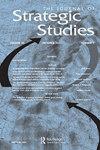从古代到核时代战略中的运气、机会、风险和机遇
IF 2
2区 社会学
Q2 INTERNATIONAL RELATIONS
引用次数: 0
摘要
在商业和军事战略方面,如果失败的潜在代价不会过高,而胜利的收益值得下这样的赌注,那么冒险可能会受到鼓励。在军事背景下,以侵略和征服为目标的一方可能会冒这样的风险。机遇,运气,决定冒险的结果,在历史上被不同地看待——宿命论,在中世纪盛行——被认为是不可影响的东西,或者,像在古代和近代,作为一个开放的因素,由精明有力的军事指挥官或谨慎的规划者来影响。新形势可能被视为危险和有风险的,人们必须对冲这些风险。或者,它们可以被视为一个为自己的利益而改变事物的机会。这可以通过广泛的应急计划来实现,或者通过迅速抓住机会,运用天才将军的妙招,将新的发展转变为自己的优势,始终意识到这是一场赌博,结果不确定。虽然这样的赌博可能会赢得或输掉一场战斗,进而导致一场战争,但在核时代,考虑到潜在的负面后果,这样的赌博似乎很难证明是合理的。本文章由计算机程序翻译,如有差异,请以英文原文为准。
Fortuna, chance, risk and opportunity in strategy from Antiquity to the Nuclear Age
Taking risks might be encouraged, both in business and military strategy, when the potential price of losing would not be excessive while the gains in winning, worth wagering such a bet. In military contexts, a side set on aggression and conquest might take such a risk. Chance, fortuna, determining the outcome of risk taking has been seen differently throughout history – fatalistically, as prevalent in the Middle Ages – as been something that could not be influenced, or, as in Antiquity and in more recent times, as a factor open to influence by the astute and forceful military commander, or to prudent planners. New situations could be seen as dangerous and risky, with risks against which one has to hedge. Or they could be seen as a chance to change things in one’s own interest. This might be done through extensive contingency planning, or by seizing an opportunity quickly, applying the genius general’s coup d’oeil to turn a new development to one’s advantage, always conscious that this was a gamble and the outcome uncertain. While such a gamble could win or lose a battle and in turn a war, in the nuclear age, such a gamble would seem difficult to justify given the potential negative outcomes.
求助全文
通过发布文献求助,成功后即可免费获取论文全文。
去求助
来源期刊

Journal of Strategic Studies
Multiple-
CiteScore
4.00
自引率
5.30%
发文量
40
期刊介绍:
The defining feature of The Journal of Strategic Studies is its commitment to multi-disciplinary approach. The editors welcome articles that challenge our historical understanding of man"s efforts to achieve political ends through the application of military and diplomatic means; articles on contemporary security and theoretical controversies of enduring value; and of course articles that explicitly combine the historical and theoretical approaches to the study of modern warfare, defence policy and modern strategy. In addition to a well-established review section, The Journal of Strategic Studies offers its diverse readership a wide range of "special issues" and "special sections".
 求助内容:
求助内容: 应助结果提醒方式:
应助结果提醒方式:


